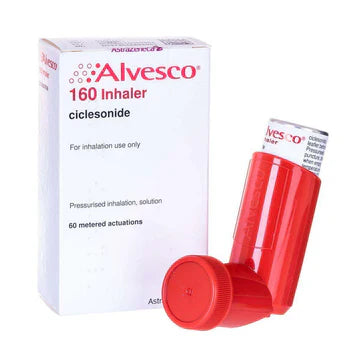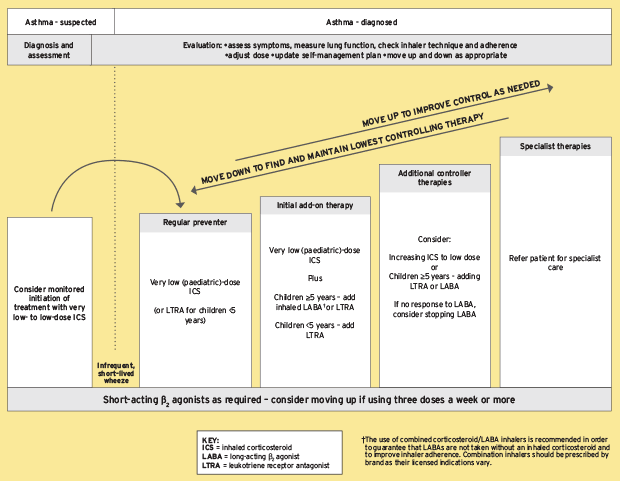Asthma and acid reflux: Is there a connection?

Related products
Asthma and Acid Reflux: Is There a Connection?
Introduction Asthma, a chronic inflammatory condition affecting the airways, and gastroesophageal reflux disease (GERD), a chronic digestive disorder characterized by the reflux of stomach acid into the esophagus, are two seemingly unrelated conditions. However, research has demonstrated a potential connection between the two. This article will explore the relationship between asthma and acid reflux, discuss the underlying mechanisms, and provide guidance on managing both conditions.
The Prevalence of GERD in Asthma Patients
Studies have shown that people with asthma are more likely to experience GERD than the general population. According to Dr. Emily Pennington, a pulmonologist and asthma specialist, up to 60% of people with asthma also have GERD[1]. This prevalence is significantly higher compared to the general population, where GERD affects around 20% of individuals[2]. If you would like to read about Asthma in general read our article on Asthma.
.
Understanding the Link Between Asthma and Acid Reflux
The exact relationship between asthma and GERD remains unclear, but several theories attempt to explain the connection. Dr. Pennington explains that the two most widely accepted theories are the "reflex theory" and the "microaspiration theory"[1].

Reflex Theory
The reflex theory proposes that acid reflux irritates the esophagus, triggering a reflex that causes the airways to constrict, leading to asthma symptoms[3]. In support of this theory, studies have shown that esophageal acidification can lead to bronchoconstriction in patients with asthma[4].Microaspiration Theory
The microaspiration theory suggests that small amounts of stomach acid are inhaled into the airways, causing inflammation and exacerbating asthma symptoms[5]. This theory is supported by the fact that the presence of pepsin, a stomach enzyme, has been found in the lungs of asthma patients[6].Acid Reflux as a Potential Trigger for Asthma Symptoms
Dr. Pennington emphasizes that acid reflux can be a trigger for asthma symptoms in some individuals, potentially worsening existing asthma or even causing new-onset asthma[1]. Acid reflux can lead to coughing, chest tightness, and wheezing, which are also common asthma symptoms[7]. It is essential for healthcare professionals to consider GERD as a potential contributor to asthma symptoms and provide appropriate treatment when necessary.Treating GERD to Improve Asthma Control
If GERD is identified as a contributing factor to asthma symptoms, managing acid reflux can lead to improved asthma control. Dr. Pennington recommends several strategies for treating GERD and potentially reducing asthma symptoms[1]: Lifestyle modifications: Making dietary changes, such as avoiding foods that trigger acid reflux, eating smaller meals, and avoiding lying down shortly after eating, can help reduce the occurrence of GERD symptoms. Additionally, maintaining a healthy weight and avoiding smoking can improve overall health and GERD management. Medications: Over-the-counter antacids, H2 blockers, and proton pump inhibitors (PPIs) can help neutralize or reduce stomach acid production, thus alleviating GERD symptoms. It is essential to discuss medication options with a healthcare professional before starting any new treatments. Surgical intervention: In severe cases of GERD that do not respond to lifestyle modifications and medications, surgical intervention, such as fundoplication, may be necessary to prevent stomach acid from entering the esophagus.
Managing Asthma and Acid Reflux Simultaneously
For individuals experiencing both asthma and acid reflux, a comprehensive treatment plan addressing both conditions is crucial. Dr . Pennington suggests working closely with healthcare professionals to create a personalized plan that addresses the unique needs of each patient[1]. This plan should include the following components: Asthma medications: Ensure proper use and adherence to prescribed asthma medications, such as inhaled corticosteroids, long-acting beta-agonists, and short-acting beta-agonists, to maintain optimal asthma control. GERD management: As mentioned previously, implementing lifestyle modifications, taking appropriate medications, and considering surgical intervention when necessary can help manage GERD symptoms and potentially reduce asthma symptoms. Monitoring and adjusting treatment: Regular follow-up with healthcare professionals is essential to monitor the effectiveness of the treatment plan and make adjustments as needed. Identifying and avoiding triggers: In addition to managing GERD, it is crucial to identify other potential asthma triggers, such as allergens, air pollutants, and respiratory infections, and take steps to minimize exposure.
Conclusion
The connection between asthma and acid reflux is complex and not yet fully understood. However, research indicates that there is a significant overlap between the two conditions, with GERD potentially acting as a trigger for asthma symptoms in some individuals. Managing acid reflux through lifestyle modifications, medications, and, in some cases, surgical intervention can help improve asthma control for those affected by both conditions. Collaborating with healthcare professionals to create a personalized treatment plan addressing both asthma and GERD is essential for optimal management and improved quality of life.
References
1: Pennington, E. (2022). Personal communication.
2: El-Serag, H. B. (2007). Time trends of gastroesophageal reflux disease: A systematic review. Clinical Gastroenterology and Hepatology, 5(1), 17-26. https://doi.org/10.1016/j.cgh.2006.09.016
3: Harding, S. M. (2003). The role of gastroesophageal reflux in chronic cough and asthma. Chest, 123(5), 167S-170S. https://doi.org/10.1378/chest.123.5_suppl.167S
4: Wu, D. N., Tanifuji, Y., Kobayashi, H., Yamauchi, K., Kato, C., & Suzuki, K. (2000). Effects of esophageal acid perfusion on airway hyperresponsiveness in patients with bronchial asthma. Chest, 118(6), 1553-1556. https://doi.org/10.1378/chest.118.6.1553
5: Patterson, R. N., Johnston, B. T., MacMahon, J., Heaney, L. G., & McGarvey, L. P. (2007). Oesophageal pH monitoring is of limited value in the diagnosis of "reflux-cough". European Respiratory Journal, 30(5), 947-951. https://doi.org/10.1183/09031936.00027607
6: Pacheco-Galván, A., Hart, S. P., & Morice, A. H. (2011). Relationship between gastro-oesophageal reflux and airway diseases: The airway reflux paradigm. Archives of Bronconeumología (English Edition), 47(4), 195-203. https://doi.org/10.1016/S1579-2129(11)70060-9
7: Harding, S. M. (2002). Gastroesophageal reflux and asthma: Insight into the association. Journal of Allergy and Clinical Immunology,
Related Asthma Treatments
- Buy Asthma Inhalers & Treatment Online
- Buy Ventolin Accuhaler
- Buy Ventolin Evohaler
- Buy Salbutamol Inhaler
- Buy Clenil Modulite
- Buy Qvar Aerosol Inhaler
- Buy Salamol Inhaler
- Buy Able Spacer
- Buy Symbicort Turbohaler
- Buy Salamol Easi Breathe Inhaler
- Buy Sereflo
- Buy Child Aerochamber
- Buy Spiriva Respimat
- Buy Sirdupla
- Buy Duoresp
- Buy Qvar Inhaler
- Buy Pulmicort Turbohaler
- Buy Seretide Accuhaler
- Buy Montelukast
- Buy Serevent Evohaler
- Buy Kelhale Inhaler
- Buy Fostair Inhaler
- Buy Flutiform Inhaler
- Buy Flixotide Accuhaler
- Buy Bricanyl Inhaler
- Buy Atrovent Inhaler
- Buy Alvesco Inhaler
- Buy Airomir Inhaler
Related Asthma Articles and Information
- Asthma: Definition, Causes, Signs and Symptoms, Diagnosis, and Treatments
- Living with Asthma
- Allergic Asthma
- Brittle Asthma
- Asthma Diagnosis and Testing
- Eosinophilic Asthma Guide
- BTS Asthma Guidelines
- Allergies & Asthma
- Reactive Airway Disease
- Do I have Asthma? (Quiz)
- Is Asthma a disability?
- NICE Guidelines on Asthma
- Asthma Control
- Difference Between Asthma and COPD
- Vocal Cord Dysfunction
- Asthma Attacks
- Exercise-Induced Asthma
- What does an Inhaler do to someone without an Inhaler?
- Can I claim PIP for Asthma?
- How to use an asthma inhaler
- How to use a peak flow meter
- Is Salbutamol a Steroid?
- Montelukast, Side Effects and Uses
- AERD












 Rated Excellent by 26,523+ Reviews
Rated Excellent by 26,523+ Reviews